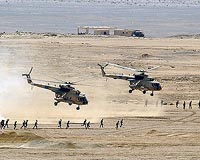| . |  |
. |
Beijing (AFP) July 8, 2010 China said Thursday that development in the country's restive far western regions was key to nationwide stability, a year after deadly ethnic violence rocked Xinjiang. The impoverished west accounts for more than two thirds of China's land mass and 18,000 kilometres (11,000 miles) of border, and has "complicated" religious problems, said a senior official from the top economic planning agency. "The entire country will not be stable if the western areas are not stable," Du Ying, vice chairman of the National Development and Reform Commission (NDRC), told a news conference. "The western areas are a key home to ethnic minority groups and many parts are impoverished.... The task of stabilising the border areas is arduous." Du made the comments days after China on Monday marked the first anniversary of deadly ethnic unrest in Xinjiang between the mainly Muslim Uighurs and majority Han Chinese that left nearly 200 dead and 1,700 injured. Earlier this week, the NDRC announced a plan to invest 100 billion dollars in 2010 in 23 new infrastructure projects in western regions as part of efforts to boost demand and raise living standards. The 682.2 billion yuan will be used to build railways, roads, airports, coal mines, nuclear power stations and power grids, the NDRC said. About 66 percent of China's poor live in the western regions, earning less than 1,196 yuan (175 dollars) a year, Du said. China has long sought to boost development in the poorer western areas. It spent 2.2 trillion yuan on 120 major projects between 2000 and 2009, the economic planner said. State media reported in May that Beijing would pour around 10 billion yuan in economic aid into Xinjiang from 2011 in a bid to raise the living standards of the Uighur minority.
Share This Article With Planet Earth
Related Links News From Across The Stans
 Afghan air corps flies turbulent skies
Afghan air corps flies turbulent skiesAboard An Afghan Air Force Helicopter, Afghanistan (AFP) July 8, 2010 "They shouldn't be flying if it's doing that, should they?" said US Captain Sean Masters. "I wouldn't fly it." About 3,500 feet (1,000 metres) above troubled south-central Afghan province Ghazni, the US air force adviser had just been told that the Russian-built helicopter flying alongside appeared to be having engine problems. The engine gauge was swerving up and down, Afghan Air Force ... read more |
|
| The content herein, unless otherwise known to be public domain, are Copyright 1995-2010 - SpaceDaily. AFP and UPI Wire Stories are copyright Agence France-Presse and United Press International. ESA Portal Reports are copyright European Space Agency. All NASA sourced material is public domain. Additional copyrights may apply in whole or part to other bona fide parties. Advertising does not imply endorsement,agreement or approval of any opinions, statements or information provided by SpaceDaily on any Web page published or hosted by SpaceDaily. Privacy Statement |